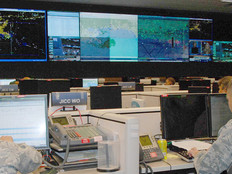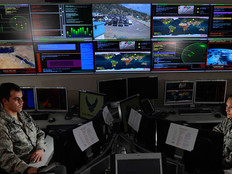The Military Might Need to Change Its Culture for Younger Cyberwarriors
The Army officer of tomorrow is going to have to be as adept at fending off network intrusions as he or she is at firing an M4 carbine rifle. Yet even as the armed forces recruit and train a new generation of cyberwarriors, they are also confronting cultural changes to accommodate those young recruits.
Some Army officers and others steeped in the military say the service branches need to become more flexible and less hierarchical to adapt to this new class of recruits — and to retain them. The armed forces also need to rethink what makes a good soldier in the age of cyberwar.
At the same time, military culture is not going to change overnight, officers caution. There will likely be some push-and-pull between the top brass and lower-level officers as the services try and figure out how to bring a new kind of soldier into their ranks.
A New Kind of Military Culture in the Cyber Era
As FCW recently reported, the armed forces are making cybersecurity a fundamental part of how they train and recruit soldiers:
The Navy has added mandatory cyber courses for all midshipmen, and the first class of cyber operations majors graduated in 2016. In recent years, the Army has created the Army Cyber Institute, the Army Cyber Center of Excellence and a cyber leader development program that involves cyber clubs, competitions and summer programs with industry. And the Air Force recently launched CyberWorx, a new cyber innovation center at the Air Force Academy that includes courses and one-week ‘cyber sprints’ that are private-public partnerships designed to solve operational problems.
All of this is forcing top commanders to confront how longstanding military culture is clashing with how the new generation of cyberwarriors operates. At the same time, the programs are designed to help cybersecurity-focused soldiers integrate technology into their command structures.
Col. Jeff Collins, the director of CyberWorx, told FCW that the program is aimed at helping educate all cadets from different academic backgrounds in human-centered approaches to problem solving.
“All of them have to understand technology, and how you integrate technology into the mission that you are trying to do,” he says. “And all of them need to understand this better way of partnering with industry, this better way of solving problems.”
Collins told FCW the courses are focused more on management than technology, since the Air Force wants to help future airmen who are focused on cybersecurity “navigate military structures and better link information technology and operational technology and to leverage industry.”
The Air Force wants to bring more innovation education into the entire four-year program for cadets, Collins says. Meanwhile, according to FCW, the CyberWorx program also has one-week sprint programs, which are designed to bring in mid-level officers “to help drive a cultural change in the service that recognizes the value of new airmen and innovative thinking.”
“One of the areas we end up talking about with the cadets is about how as a young person... your bosses may not be receptive to your ideas, so what kind of approaches do you take for that,” Collins says.
Military culture can inhibit innovative ideas from being heard, especially from soldiers who are lower down in the chain of command, Collins acknowledges. Most senior generals realize that “the 19-year old airman might have the best idea and so we have to able to be flat, listen. But I'm not sure that we have processes in place to enable that, and we certainly don't have an acquisition system that is ready to rapidly deliver the idea of a 19-year old to the whole bureaucracy.”
Collins told FCW he is concerned that the Air Force’s culture is likely to “crush” young cyberofficers, and thinks it is important to make sure new recruits can be allowed to flourish and set an example for future airmen.
Changing Ideas of a ‘Good Soldier’ in the Cyber Era
The military’s longstanding focus on what makes an ideal soldier may need to shift in a world where young officers need cybersecurity skills.
Sen. Claire McCaskill (D-Mo.), a member of the Senate Armed Services Committee, thinks that it does not make sense for the Missouri National Guard to penalize soldiers who may have the best cybersecurity talents but struggle with physical fitness.
“Having that physical capability is very, very important, but if you are part of an elite team that is working in a cyber space, where we are trying to go toe-to-toe with people who have no constitutions . . . who have no rules they have to obey . . . we have to get the best and the brightest,” she said last year, according to Military.com. “I am not sure that’s always the guy who can do the most sit-ups.”
Max Brooks, a nonresident fellow at the Modern War Institute at West Point and a senior nonresident fellow at the Atlantic Council, recently wrote in an op-ed in The Hill that U.S. Cyber Command is having trouble finding the right quantity and quality of troops.
“Some won’t be able to handle the physical rigors of basic training. Some won’t be able to pass a drug test,” he wrote. “Many simply don’t have the kind of brains wired for precision marching and crisp solutes.”
Brooks suggests that instead of the Army turning over such soldiers to the National Security Agency or abandoning a cybersecurity command, that these soldiers be given slightly different uniforms to distinguish them from combat soldiers.
Meanwhile, Col. Carlos Vega, chief of outreach for the Army Cyber Institute, told FCW that bringing new cyberwarriors into the existing military culture and bureaucracy is like trying to fit a square peg into a round hole.
“We’re not just looking at the soldier that's being trained, we’re looking at the organizational structure that's going to receive these soldiers,” he says. “Often times, they’ll come into a new command with this new set of skills that is very unfamiliar and the commander doesn’t know how to use that.”
The ability to code and to think innovatively about cybersecurity “don’t necessarily transcend to some of the things that we value in our traditional culture,” he says.
The Army is working to create positions, requirements and command structures specifically tailored to young cyberwarriors that will take full advantage of their skills, Vega told FCW, which will incentivize them to stay in the service. “Are we ready to give that kind of specialization to the cyber soldier?” he asks.









